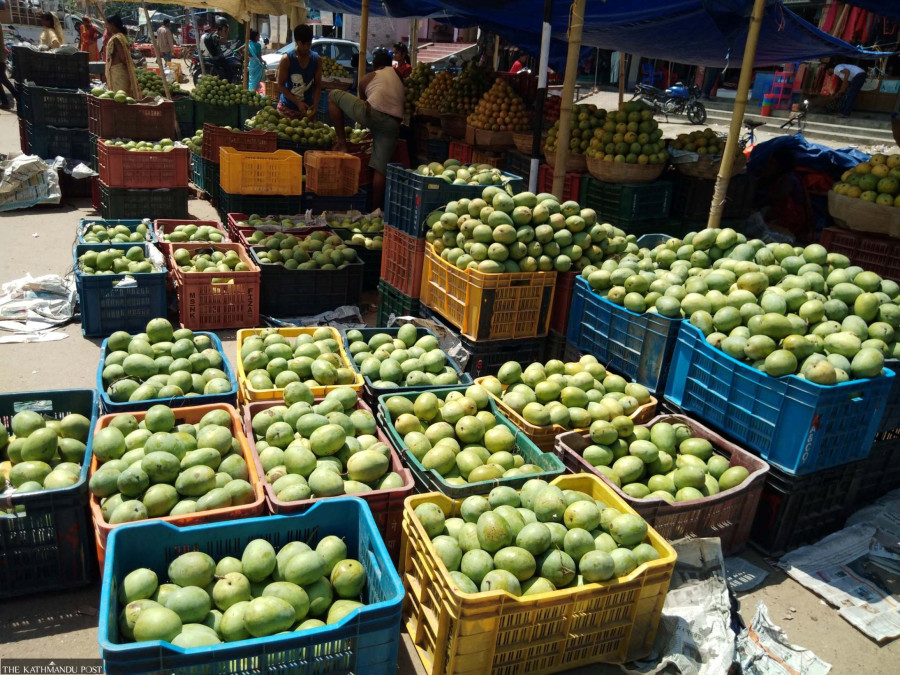Money
Mango farmers say government should set floor price
Traders claim the price of mangoes has plunged this year due to a glut in production but farmers say middlemen reap huge profits.
Bharat Jarghamagar & Sima Tamang
Mango farmer Phuleshwor Prasad Kurmi of Malhanwa in Lahan Municipality owns a 1.6-hectare orchard where he has 150 mango trees.
During season, he and his family are engaged in irrigating the trees, applying manure and spraying pesticides so they will have a good harvest.
Kurmi earns around Rs400,000 from his mangoes per season. Out of this amount, he spends Rs100,000 on pesticides and fertilisers.
Kurmi's younger son is studying MBBS and his elder son is an accountant. His daughter is studying to be a health assistant.
He has been able to give his children a good education with the money he earns selling mangoes, but he says it is not fair that middlemen take a big chunk of it.
“We do all the hard work on the farm, but the middlemen take most of the profits,” Kurmi complained.
Jugeshwor Sahani of Saraha Gadhiya has a similar story. He grows mangoes on his 1 hectare farm. Whenever he goes to Lahan to sell his mangoes, his heart sinks at hearing the going price.
Wholesalers pay mango farmers Rs30 per kg. The fruits then travel down the supply chain and by the time they reach Kathmandu, the largest market in the nation, the price has more than doubled.
According to the Kalimati Agriculture and Fruit Market Development Committee, the wholesale price of malda mango is Rs76 per kg. The dashari variety costs Rs86 per kg.
Retail prices range from Rs70 to Rs100 per kg. Traders claim the price of mangoes has plunged this year due to a glut.
“The wholesale price of mangoes was Rs100 per kg last year. This year, it's Rs50 to Rs75 per kg,’ said Amar Baniya, president of the Nepal Wholesale Fruit Traders Association. “The current economic crisis and oversupply has kept prices low this year.”
According to Baniya, daily sales of domestically grown mangoes amount to Rs5 million to Rs10 million.
Baniya said that farmers normally make a deal with traders to sell the fruits before they ripen. “But some farmers sell them in the local market.”
Mango grower Sahani says that farmers are cheated by the many layers of middlemen. “The government should set a minimum support price for mangoes too.”
In Siraha, the mango orchards are filled with a large variety of mango tress like amrapali, malda, Bombay, dashari and kalkatiya.
According to the Agricultural Knowledge Centre in Siraha, farmers are expected to gather 99,500 tonnes of mangoes during this harvest season which began in early June.
Mango orchards in Siraha are spread over 9,350 hectares. Last year, 98,000 tonnes of mangoes were produced. This year, the winter drought and pest infestation during the flowering season and hailstorms during the fruit-bearing stage hit production, the centre said.
Farmers say there is no proper market where they can conduct collective bargaining for their produce.
Farmers around Lahan, which is known for mangoes, have branded their mangoes as Lahan’s Mango with the help of Lahan Municipality.
Mahesh Chaudhary, mayor of Lahan Municipality, officially launched the campaign to brand Lahan’s mangoes last Thursday.
Prakash Shah, head of the agriculture department at the municipality, said around 90,000 kg of mangoes under the new brand would be supplied to different cities this season.
The municipality has partnered with Saraswati Agriculture Firm to set up stalls. The firm has packed the mangoes in 9-kg packets and has so far prepared 12,000 packets.
"The municipality has warned farmers not to apply harmful chemicals while packaging the fruit," said Shah.
“This will ensure that the mangoes sold to the public are safe to eat,” he said. “Doctors have also been advising people not to eat mangoes contaminated with chemicals used to ripen them.”
Domestic mangoes last for around two months. Indian mangoes dominate the market before and after the season.
According to the Ministry of Agriculture and Livestock Development, Saptari is the largest producer of mangoes in the country. In the fiscal year 2020-21, Saptari farmers produced 114,898 tonnes of mangoes on 9,323 hectares.
Mango is grown on 51,681 hectares in the entire country. In the fiscal year 2020-21, production across the country totalled 466,266 tonnes, the ministry’s statistics show.




 16.46°C Kathmandu
16.46°C Kathmandu















